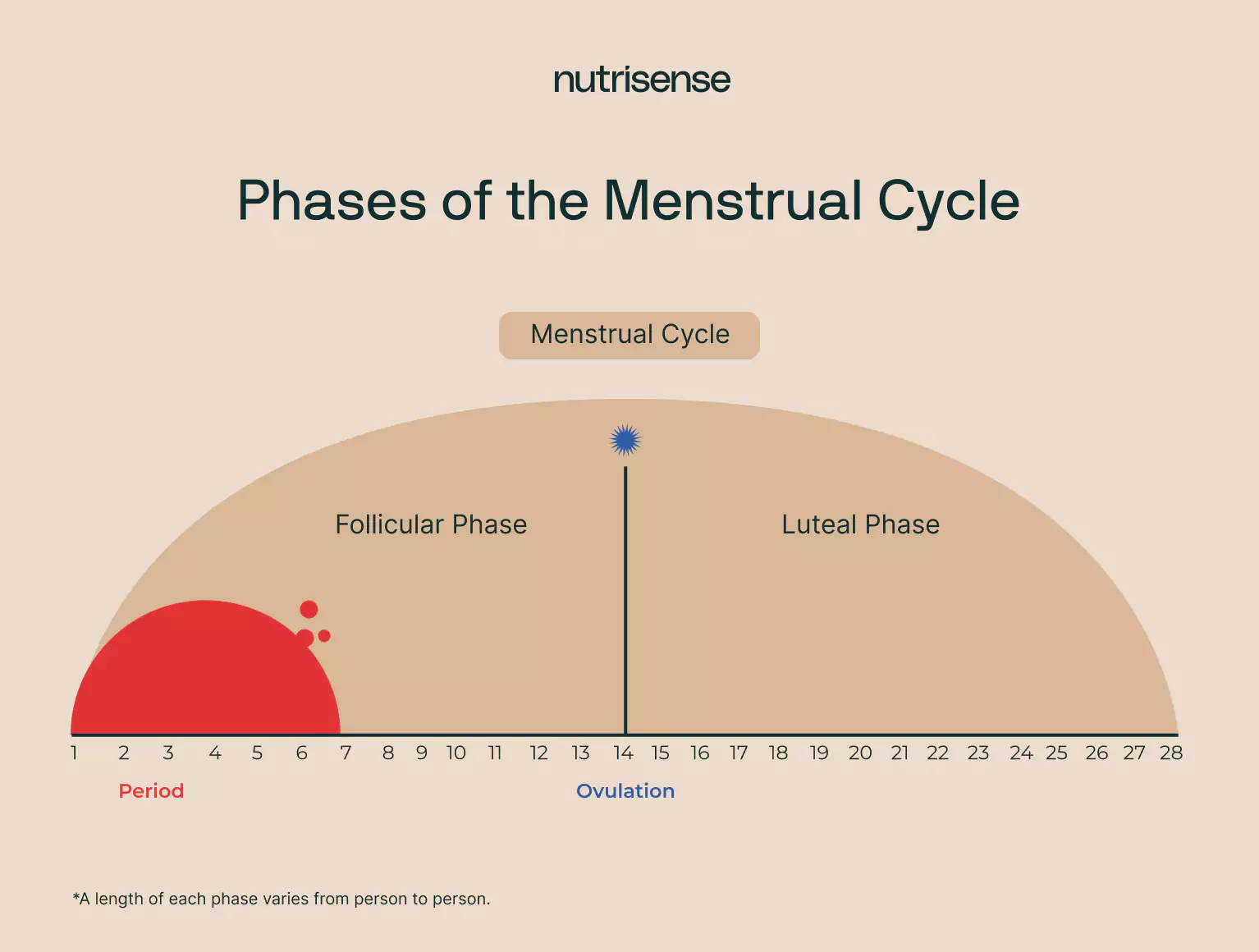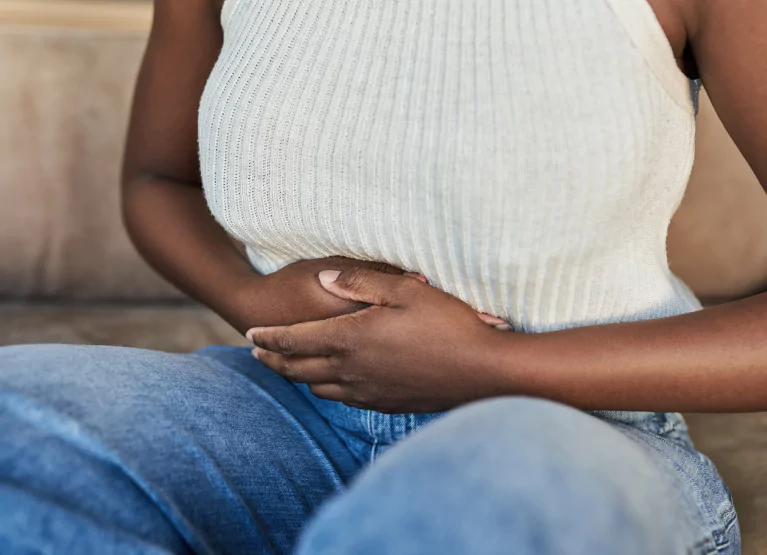Period Weight Gain: How Much Is Normal & When Does It Go Away?

Key Takeaways
- How much is normal? It is common to gain 2 to 6 pounds of water weight during your period.
- When does it stop? This usually resolves 3 to 5 days after menstruation begins.
- Why it happens: Shifts in progesterone and insulin sensitivity cause fluid retention, not necessarily fat gain.
- How much is normal? It is common to gain 2 to 6 pounds of water weight during your period.
- When does it stop? This usually resolves 3 to 5 days after menstruation begins.
- Why it happens: Shifts in progesterone and insulin sensitivity cause fluid retention, not necessarily fat gain.
Slight weight fluctuations during your period are common and are mostly related to changing hormone levels during your cycle. But, if you find your bloating or water retention is getting increasingly uncomfortable, there are some things you can try to alleviate or prevent these symptoms and severe period weight gain from occurring.
In this article, we'll break down each phase of the menstrual cycle, how it affects your hormones, and how these factors can lead to temporary weight gain.
Water Weight vs. Fat Gain: What’s the Difference?
It is important to distinguish between fluid retention and actual adipose tissue (fat) gain. Because insulin sensitivity often drops during the luteal phase, your body may store more glycogen (carbohydrate energy) in your muscles. For every gram of glycogen stored, your body stores about 3 to 4 grams of water. This leads to the "puffy" feeling that many mistake for fat gain.
Phases of the Menstrual Cycle

The menstrual cycle can last anywhere from 25 to 31 days, although healthy cycles are usually consistent. There are two main phases of the menstrual cycle, and each one can significantly impact your hormone levels. Let's review each phase and its effect on estrogen and progesterone levels to understand how they're connected to weight gain and bloating.
Follicular Phase
The follicular phase of the cycle starts when you begin menstruating and lasts for approximately two weeks until ovulation begins. During this phase, your body prepares to release an egg for fertilization. As your body prepares to do so, your estrogen levels rise.
Menstruation
Menstruation is what you typically think of when you hear the word “period.” It's the main event of the follicular phase. During this event, the uterus sheds its lining and tissue, or period blood, as most people call it.
At the beginning of this phase, your levels of estrogen and progesterone are low. However, estrogen and progesterone levels slowly start to rise towards the end of your period. The shedding process usually lasts between two to seven days, depending on how your unique body works.
Luteal Phase
The luteal phase makes up the remainder of your menstrual cycle. After the egg is released during ovulation, the ruptured follicle that held it remains on the uterine lining.

In this phase, progesterone levels rise (and are at their highest) in preparation of fertilization. If the egg is not fertilized, your progesterone levels will drop, leading to the shedding of the uterus lining and restarting the cycle.
Ovulation
Ovulation, the main event during the luteal phase, occurs about halfway through the menstrual cycle (although this may differ for different people) and tends to last for 24 hours. During this phase, the mature egg is released from your ovary.
During the ovulation phase of your cycle (or the fertile window), the chances of getting pregnant are the highest. Estrogen will peak just before you begin ovulating and will start dropping shortly after.
Other Common Symptoms You May Experience During Your Cycle

Menstruation is a complex process occurring inside the uterus each month. Because of this, it's not surprising that these hormonal shifts would naturally lead to some symptoms as each phase takes place.
Here are some other common symptoms of premenstrual syndrome (PMS) you may experience before or during your time of the month. These physical symptoms may also occur due to the same factors that lead to period-related weight gain, such as changing hormone levels.
- Mood swings
- Fluid retention
- Brain fog
- Constipation
- Abdominal cramps
- Gastrointestinal issues (although this may indicate an underlying condition; more on that below)
- Fatigue
- Headache or migraine
- Anxiety
- Breast tenderness
- Low sex drive
It's important to remember that everyone's body is different, and some people may not experience the same set of some or all of these symptoms. If you're concerned about any symptoms you may be experiencing during your cycle, consult a gynecologist or women's health specialist for guidance.
What Causes Period-Related Weight Gain
While it’s common to see the number on the scale fluctuate a little during your menstrual cycle, it’s important to remember that this is generally temporary. According to Dr. Stephanie Buck-Haskin, MD, F.A.C.O.G, OB-GYN:
"Many women experience weight gain right before their cycle and it is normal. PMS weight gain is caused from fluctuation in estrogen and progesterone which cause fluid retention, bloating, and changes in appetite."
So, you can see that many factors can cause your body weight to rise by a few pounds while on your period. Let’s get into the research behind a few of the most common potential causes of period weight gain.
Hormonal Changes

The most common cause of weight gain or fluctuation during your cycle is hormonal fluctuations. As we discussed earlier, estrogen and progesterone levels constantly shift in preparation for your egg’s fertilization.
Weight gain or fluctuation may occur in some during their luteal phase (a little before the period begins) when progesterone levels rise. High progesterone levels can trigger increased appetite or cravings, which we will discuss in further detail below. They can also be linked with higher blood glucose values, related to a decreased insulin sensitivity.
Premenstrual syndrome, or PMS — a syndrome that involves experiencing many unpleasant symptoms before a period like cramping, bloating, cravings, and mood swings — may also be caused by these shifting hormone levels, although these shifts are more significant in PMS. PMS occurs during the last week of the luteal phase, just before menstruation begins.
Bloating and Water Retention
Various factors, including gas, gastrointestinal issues, or fluid retention, can cause bloating. However, hormonal fluctuations, specifically the changes in progesterone, during the menstrual cycle can lead to bloating or abdominal discomfort.
A higher salt intake can also cause fluid retention and bloating, as some women notice when they’re in their luteal phase. While these symptoms can lead to a few extra pounds on the scale, this water weight is temporary and usually goes away on its own.
Dietitian and glucose-certified expert Amanda Donahue, MS, RD, CD adds more context here, explaining: “Progesterone increases sodium excretion, so hyponatremia (too low sodium) could be a problem. Water also moves from the bloodstream into cells, which decreases blood volume and may cause bloating. Some of my clients find it helpful to add extra salt to food. Or, you can add a pinch of sea salt to your water!”
Increased Appetite

If you find yourself experiencing cravings either before your period starts or during menstruation, you’re not alone. During the luteal phase, progesterone levels peak in your body, which may lead to increased food cravings and overall food consumption.
Other research has found evidence to confirm that women tend to consume more protein and experience food cravings during the luteal phase of their cycle. Carbohydrate cravings have also been observed to occur during the luteal phase, which can lead to increased energy intake and cause weight gain in some people.
Conversely, estrogen may inhibit appetite. Higher estrogen levels during the follicular phase may lead to fewer cravings at the beginning of the menstrual cycle.
How to Combat Weight Gain During Your Period
Temporary weight gain during your period is a common side effect of the menstrual cycle that usually fluctuates back to normal within a few days. However, if you want to limit uncomfortable symptoms such as bloating, there are a few things you can try out.
Exercise
Getting some extra steps in by walking (especially after meals, which helps with your glucose levels, too!), going to the gym, or moving your body in any way you can are all great ways to increase your physical activity. Studies show exercise may have diuretic properties, which could help you reduce period bloating.
In one study, women who exercised three times a week for 20 minutes were observed to have improved PMS symptoms. Exercise can also be a beneficial treatment for other causes of bloating connected to gas or conditions such as irritable bowel syndrome (IBS).
Physical activity can also help support healthy blood sugar levels in women during this time.
Stay Hydrated

Although it sounds odd, drinking plenty of water can help prevent water retention. It occurs because when you are dehydrated, your body retains water to help keep its water levels optimal.
Staying hydrated is crucial for healthy blood sugar levels, kidney and liver function, metabolism, digestive health, and brain function. If you find it hard to drink enough water throughout the day, here are some dietitian-recommended hydration strategies to follow.
Stay Away From Salty Foods
Reducing your salt intake can significantly help manage period-related bloating. High sodium consumption can cause your body to retain extra water, exacerbating bloating and discomfort. Instead, focus on eating a balanced diet rich in whole foods like fruits, vegetables, whole grains, and lean proteins, supporting overall hydration and nutrient balance.
Manage Stress
Stress can make your hormonal fluctuations worse and may lead to weight gain for some individuals. In one study, women who reported higher stress levels were more likely to experience bloating and food cravings during their period.
To manage your stress levels, try out stress management techniques like mindfulness meditation, yoga, breathing exercises, or talking with a therapist or trusted friend.
Sip Herbal Teas To Curb Food Cravings
Pre-period cravings are a common complaint during PMS. And it's a real thing! Not only can you experience more sugary food cravings during your period, but you may also crave specific types of foods due to the hormonal changes happening in your body.
Sipping herbal teas like chamomile, ginger, and peppermint can help reduce bloating and calm PMS symptoms.
Try Magnesium Supplements and B Vitamins
Researchers have studied the effects of supplementing with magnesium and vitamin B6 together on the symptoms of PMS. Magnesium on its own may help alleviate period cramps.
In one study, researchers investigated the benefits of magnesium and vitamin B6 on period-related water retention, anxiety, and cravings. They found these supplements to relieve these symptoms significantly compared to the placebo group.
If you prefer to increase your magnesium levels through whole food sources, add extra green vegetables, seafood, nuts/seeds, legumes, or whole grains to each meal.
Track Your Changing Hormone Levels

While some bloating is common during menstruation, significant and persistent weight fluctuations and menstrual cramps (as well as any other symptoms mentioned previously) may indicate hormonal imbalances. They may also indicate an underlying condition such as:
- PCOS or polycystic ovarian syndrome
- Endometriosis
- SIBO (or small intestinal bacterial overgrowth) or other gut dysbiosis
- PMDD or premenstrual dysphoric disorder
You may want to track your hormone levels throughout your cycle to reduce bloating or period-related weight gain. A functional practitioner or nutritionist may be able to suggest practical ways to do this.
- One common method is testing your sex hormones on day three and day 21 of your cycle.
- Another common method is the DUTCH test, a functional test that provides a deeper insight into several hormones, including estrogen and progesterone, as well as their metabolites.
Once you've worked with your practitioner or nutritionist to identify specific hormonal imbalances, they can tailor a nutrition and lifestyle plan to help support your hormone levels.
Try Cycle Syncing
Cycle syncing may be one way to support your body through the hormone shifts during your cycle. It involves aligning your diet, exercise, and other lifestyle habits with the phases of your menstrual cycle. This may look like:
- Focusing on restorative and rejuvenating exercise during menstruation and the beginning of the follicular phase.
- Eating more during the luteal phase, perhaps in preparation of your period.
Listening to your body's cues during the different phases may promote a healthy attitude towards menstruation, support your body during the hormone shifts, and potentially help alleviate period-related weight gain.
FAQs
How much weight do you gain during your period?
An increase in weight during your period can vary from person to person, and don't worry it's water weight. Women may experience a normal weight gain between two to six pounds during their menstrual cycle.
When does period weight gain go away?
You will lose this extra weight approximately three to five days following the last day of your period.
When do you weigh the most in your cycle?
Women generally weigh the most during their period due to increased water retention and bloating. However, this can vary from person to person. If you believe your drastic body weight gain or excess water retention is abnormal, it's always best to consult a healthcare professional.
Can stress cause weight gain during periods?
Yes! Stress can contribute to weight gain in general, and also during your period. Stress increases the production of cortisol, which can affect how your body metabolizes glucose and stores fat.
Can exercise help with period-related weight gain?
Engaging in regular exercise may help alleviate gas and bloat, as well as support hormonal balance and overall well-being. However, listening to your body and adapting your workout routine according to your energy levels throughout your cycle is essential.
Find the right Nutrisense programto turn insight into progress.
Understand Period Weight Changes with Nutrisense
Menstrual weight gain is frustrating, but it doesn't have to be a mystery! Understanding your body's normal hormonal fluctuations can help you take steps to minimize bloating and discomfort.
Other than tracking your cycle, you can actually gain a lot of insight by working with a woman’s specialist to adjust your eating habits, exercise, and overall health goals. Work 1:1 with an expert, like the specialists at Nutrisense, who are also glucose-certified and equipped to help you track your blood glucose level over time using a CGM. The data collected by a CGM can help you identify potential blood sugar imbalances and adjust your nutrition or lifestyle habits accordingly, so figure out how the amount of weight gain you experience during your period relates to your unique body.
Take our quiz to discover how Nutrisense can help you reach your goals.
FAQs From a Woman’s Health Expert
How much weight is normal to gain during your period?
2 to 6 pounds. While it varies by individual, gaining between two to six pounds of water weight is considered normal. This is primarily due to fluid retention and hormonal shifts rather than fat accumulation.
When does period weight gain go away?
3 to 5 days after menstruation starts. As hormone levels reset and progesterone drops, the body naturally sheds the excess fluid. Most women return to their baseline weight within a few days of their period starting.
Does ovulation cause weight gain?
It can. During ovulation (mid-cycle), estrogen spikes and can lead to temporary fluid retention. Some women may notice a smaller scale fluctuation during this window, distinct from the pre-period luteal phase gain.
Is period weight gain actual fat?
Rarely. Unless you have significantly increased your caloric intake, the weight you see is likely water weight caused by sodium retention and glycogen storage. A CGM can help you see how your body processes carbs differently during this phase.
Why am I gaining weight on my period despite eating well?
Hormonal fluid retention. Even with a perfect diet, the drop in progesterone can cause your body to hold onto water. Monitoring your glucose levels can help ensure that this isn't compounded by insulin resistance spikes.
Go Beyond Glucose Data with Nutrisense
Your glucose can significantly impact how your body feels and functions. That’s why stable levels are an important factor in supporting overall wellbeing. But viewing glucose isn't enough. Nutrisense, you’ll be able to learn how to use your body's data to make informed lifestyle choices that support healthy living.
One-to-one coaching
Sign up to access insurance-covered video calls to work with a glucose expert: a personal registered dietitian or certified nutritionist who will help tailor your lifestyle and diet to your goals.
Monitor and measure what matters
With the Nutrisense CGM Program, you can monitor your glucose with health tech like glucose biosensors and continuous glucose monitor (CGM)s, and analyze the trends over time with the Nutrisense App. This will help you make the most informed choices about the foods you consume and their impact on your health.
Find your best fit
Ready to take the first step? Start with our quiz to find the right Nutrisense program to help you take control.

Amanda is a Nutrition Manager and Registered Dietitian, with a Masters in Dietetics from Stephen F. Austin State University. Originally from south GA, she got her undergrad degree from Texas Tech University. She worked at a hospital in Fort Worth, TX, for 4 years as a dietitian, counseling those living with HIV.




